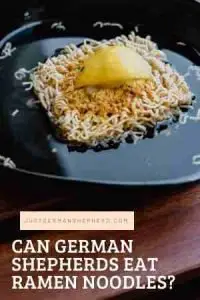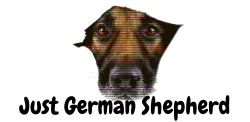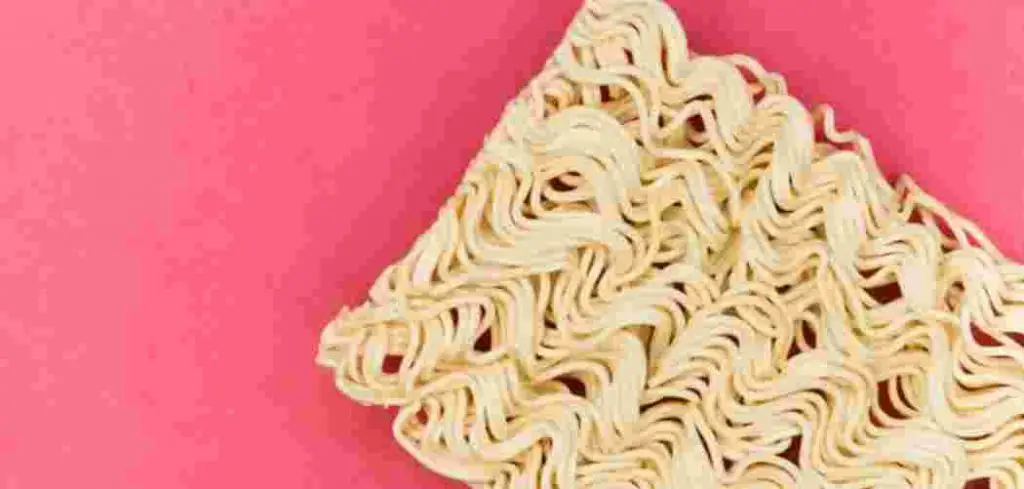
Before you feed your German Shepherds ramen noodles, it is important to consider the potential health benefits and risks. Learn more about feeding ramen noodles to German Shepherds:
Table of Contents
Can German Shepherds Eat Ramen Noodles?
German Shepherds can eat ramen noodles, but it is not necessarily a good idea and there are exceptions. While ramen noodles are generally safe for dogs, they offer very little health value and nutritional benefits. Your German Shepherd will likely be fine after eating a few bites of ramen noodles, and on rare occasions. However, feeding your German Shepherd ramen noodles often or as a substitute for his daily meals can lead to long-term heath complications.
If you’re considering giving ramen noodles to your German Shepherd, it is important to understand the ingredients in ramen noodle products can vary. The standard noodles are typically not made with ingredients that are harmful for dogs, but the flavor packets may contain hidden dangers. Certain ingredients that are toxic for dogs, like garlic, onion and spicy peppers, may be included in the ramen noodle seasonings. Read the ramen noodle package’s nutritional and ingredients information before letting your dog take a bite.
Are Ramen Noodles good for German Shepherds?
German Shepherds are lively, active dogs that require a balanced diet with many nutritional components to maintain proper health. While ramen noodles may taste delicious, they offer very little nutritional value. Ramen noodles don’t add any healthy components to your dog’s diet, but they also do not necessarily cause any harm in small amounts. Overall, ramen noodles are not considered a good food to feed your German Shepherd as part of his standard diet.
There are certain health risks associated with dogs consuming ramen noodles in large quantities or too frequently. Ramen noodles are often extremely high in sodium, ranging up to 1,000-2,000 milligrams per packet. Too much sodium can cause your dog to become dehydrated, leading to symptoms such as vomiting, lethargy and diarrhea. Due to the risk of high salt intake, it is important to provide lots of fresh water for your German Shepherd if you give him a snack of ramen noodles. This is particularly important for the German Shepherd breed, because they often spend a lot of time being active, which means hydration is a top priority at all times.
What About Raw Ramen Noodles?
When comparing raw versus cooked ramen noodles, the nutritional value and health effects are generally the same. Raw ramen noodles on their own may not cause an issue, however, the packaging materials can pose a potential risk.
If you find your German Shepherd got ahold of an entire cup or packet of ramen noodles, make sure he didn’t eat the plastic, styrofoam, or foil materials that are associated with ramen noodle packaging. These materials are not easily digested and could cause a medical emergency.
Can German Shepherd Puppies Eat Ramen Noodles?
German Shepherd puppies grow quickly and depend on a high-nutrition diet to stay healthy and develop into thriving adults. Because ramen noodles offer little to no nutritional benefits, you may want to avoid giving your German Shepherd puppy ramen noodles. The noodles essentially deliver empty calories and can lead to malnutrition or weight issues if they are used as a meal replacement for puppies.
The Bottom Line
If your German Shepherd sneaks a cup of ramen behind your back, or if you cave into his wishful eyes can share your noodles with him, he will probably be just fine. However, even though ramen noodles are most likely safe in moderation for your German Shepherd, there may be certain health risks associated with special flavoring ingredients and regular consumption of these popular noodles. If you have concerns about your German Shepherd after he ate ramen or if you have further questions about its health effects, call your dog’s veterinarian for advice.

